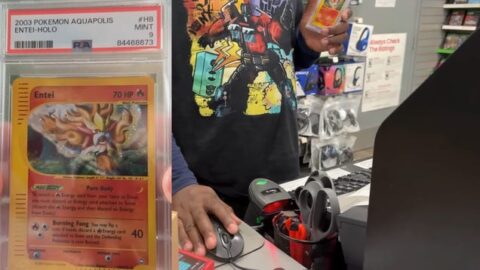
In a surprise twist, GameStop recently announced internally that some of its stores would begin buying and selling graded collectibles like Pokémon cards. There were immediately a bunch of questions like “how?” and “why?” One YouTuber recently tested exactly how the process works.
Pokémon trading card collector and controversial YouTuber Lee “Leonhart” Steinfeld visited a GameStop at a mall near Dallas, Texas, one of the few test sites for the new initiative. Greeting the poor employee in the morning right when the store opened, Steinfeld turned over a bunch of cards, including a Miriam trainer and a full art Squirtle from the base Scarlet and Violet set, to see how they were appraised and what he could get for them.
Advertisement
“These are cool,” the employee, who Steinfeld recorded, says while thumbing through the PSA graded cards in their acrylic cases. “So how does this whole grading thing work?” (The GameStop employee later told Kotaku he didn’t feel ambushed and was happy to learn on the spot but also didn’t know Steinfeld was filming him.)
GameStop announced the trade-in program earlier this month and began rolling it out immediately without taking the time to do much training. While scanning codes on the graded cases pulls up what the card should look like and the amounts the store can offer, it’s up to employees to go through an eleven-point checklist to make sure the cards aren’t fraudulent.
The GameStop employee in the video understandably ends up having to call a supervisor to walk him through the training in real time while also dealing with other customers that come into the store to buy actual games. He looks at the cards, holds them up to the light, and tries to check for any signs of tampering, but like it would be for you or I or anyone else that’s not trained in detecting fake, phony, or counterfeit PSA-graded collectibles, the process looks purely vibes-based.
Advertisement
Steinfeld estimated the value of the cards he was trading in ahead of time based on recent eBay listings, and the actual amounts GameStop paid him for them were all over the place, from pretty good to pretty terrible. Overall, he got $157 for cards worth an estimated $328, pretty close to 50 percent of the estimated value.
Advertisement
That might not sound like much considering how easy it is to sell a handful of cards online, but consider this: it’s way more than you’d get for trading in your actual games. GameStop will currently only give you $20 cash for Stellar Blade, which is $70 new on PlayStation 5 and came out less than a month ago. Then again, games are commodities, and PSA-graded cards are, by definition, collectibles. It’s hard to imagine who is selling their rare Lugia to GameStop rather than to another collector on Facebook or eBay.
Advertisement
Then again, Steinfeld seemingly made out better than some of his own fans did when buying his own Pokémon mystery boxes. Some buyers of his giveaways reported getting less than a third of the value of what they paid for them.

